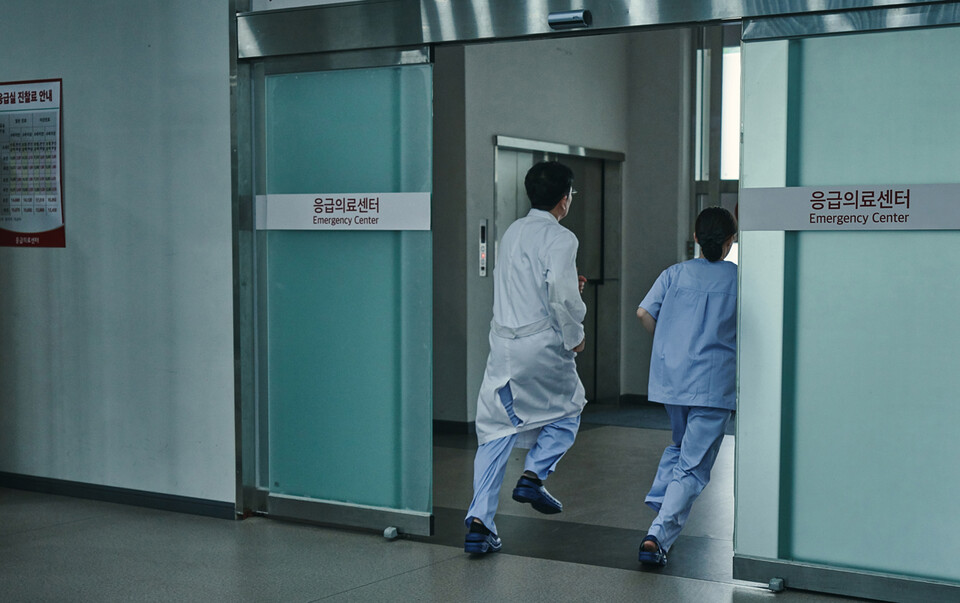
The Korean Society of Emergency Medicine (KSEM) positively evaluated the government's "Emergency Medical System Maintenance Plan," which calls for, among others, a higher co-payment for patients with minor symptoms who use emergency rooms.
However, it expressed regrets that the measures were announced only after the healthcare turmoil caused by the medical school enrollment quota increase added to the chaos in the field.
"We applaud the measures that we have been advocating for a long time, such as patients’ cost-sharing based on the severity of the emergency, higher out-of-pocket expenses for mild and non-emergency patients, and enhanced compensation for severely ill patients and nighttime care," KSEM said in a statement on Wednesday.
The society added that it expects to discuss and consult with the government in the formulation and implementation of specific action plans in the context of this emergency medical policy direction so that practical improvements can be made in the field of emergency medical care to protect the lives and safety of the public.
"We also ask the public to understand that the government's emergency medical measures are the right direction to protect their and their families’ lives when acute illness and severe trauma suddenly strike them or their families," it said. "Please respect the severity classification and judgment of emergency medical personnel, including 119 paramedics, emergency medicine doctors, nurses, and paramedics, and trust and encourage them."
The society regretted that the government worked out measures only after the chaos in the medical field, triggered by the increase in medical students, was exacerbated, calling for proper medical policies to normalize medical care.
"It is unfortunate and regrettable that the emergency medical policy was announced only after the difficulties in emergency medicine caused by the government's medical policy, including the large-scale expansion of medical school students to the point where it is impossible to provide normal medical education and fulfilling specialty training, and the public's inconvenience, dissatisfaction, and anxiety," it said.
The society continued, "We strongly urge the government to promote the right medical policy to restore and normalize the medical field for the people, emergency patients, their families, and the medical community."
Earlier in the day, the government announced the "Emergency Medical System Maintenance Plan" as the number of patients with severe illnesses visiting emergency rooms increased.
The government said that the number of moderately ill patients visiting emergency rooms has increased, exceeding usual levels, and the number of medical centers and targeted diseases restricted from treating severe and urgent illnesses has increased, adding to the load on emergency rooms.
To maintain the emergency medicine system and secure emergency room personnel, the government will provide incentives for specialists by increasing the “emergency room specialist consultation fee” and continue subsidizing labor costs and on-call allowances for new and replacement personnel to minimize the departure of specialists
It also will encourage the recruitment of additional emergency medical service providers and deploy public and military doctors to regional emergency centers with a shortage of specialists.
To streamline emergency room operations, the government will actively transfer patients with moderate or less severe illnesses to regional emergency centers or local emergency institutions to reduce the workload so that regional emergency centers can focus on treating severely ill patients, and those with sufficient manpower will be designated as base regional centers to share the work of regional emergency centers.
In particular, when a mildly ill patient visits a regional emergency center or a non-emergency patient visits a regional or local emergency center, the co-payment for medical expenses will be gradually increased to encourage patient dispersion.
"We will continue to check the operation status of hospitals by region and encourage the establishment of emergency operation systems at the hospital and local government levels," said Jung Yoon-soon, head of the Healthcare Policy Office at the Ministry of Health and Welfare.
Related articles
- 'Why do they hate us?’: Parents, students rally against government's medical student quota expansion
- Pharma industry sees unexpected influx from resigned trainee doctors
- Lack of specialists forced severely injured patient to wander around ERs
- Medical students on leave of absence join army instead of returning to school

